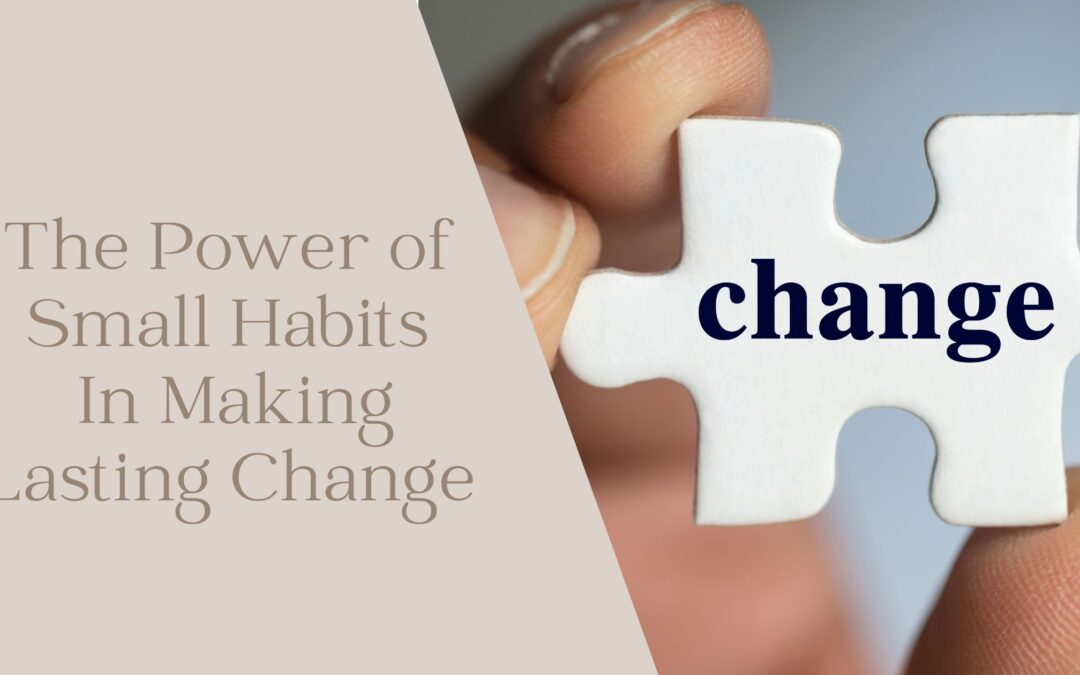
The Power of Small Habits in Making Lasting Change
Transform Your Life
Are you ready to embark on a journey of transformation?
Change can be daunting, but it doesn’t have to be overwhelming. In fact, the key to success lies in the small, consistent habits we cultivate every day.
Welcome to your guide on how to harness the power of small habits to make lasting changes in your life.
Understanding the journey of change
Change is a process, not an event. It’s about progress, not perfection. Many of us feel anxious about making changes in our lives because we often associate change with drastic shifts or monumental efforts. However, real change begins with small steps taken consistently over time.
The Power of Small Steps
Small habits may seem insignificant at first glance, but they have the power to snowball into significant transformations. Think of them as the building blocks of change. Whether it’s starting your day with a five-minute meditation, swapping out one unhealthy snack for a nutritious option, or committing to a short daily exercise routine, small steps pave the way for big changes.
Consistency as the Cornerstone
Consistency is the secret sauce of successful change. It’s not about making huge leaps once in a while but about showing up every day, even when progress feels slow. Like laying bricks to build a wall, each small action you take accumulates over time, leading to remarkable results.

Celebrating Every Milestone
Acknowledge and celebrate every small win along the way. Did you stick to your new habit for a week straight? Treat yourself to something special as a reward. Celebrating your progress not only boosts your motivation but also reinforces positive behavior, making it more likely that you’ll stick to your new habits in the long run.
Practical Tips for Incorporating Small Habits
Now that we understand the importance of small habits let’s dive into some practical tips for incorporating them into your daily life:
Start with a Clear Goal: Identify one area of your life where you’d like to see improvement. Whether it’s your health, productivity, or mindset, having a clear goal will give you direction and focus.
Break it Down: Once you’ve identified your goal, break it down into smaller, more manageable steps. For example, if your goal is to exercise more, start with a five-minute daily workout and gradually increase the duration over time.
Create a Routine: Incorporate your new habit into your daily routine to make it easier to stick to. Whether it’s meditating first thing in the morning or journaling before bed, find a time that works best for you and make it a non-negotiable part of your day.
Stay Accountable: Share your goals with a friend, family member, or accountability partner who can support you on your journey. Having someone to hold you accountable can make a world of difference in staying committed to your new habits.
Be Patient and Kind to Yourself: Change takes time, so be patient with yourself as you work towards your goals. And remember, it’s okay to stumble along the way. What matters is that you pick yourself up and keep moving forward.
The Science Behind Small Habits
But why do small habits work so effectively in making lasting change?
It all comes down to the concept of neuroplasticity—the brain’s ability to rewire itself in response to new experiences and behaviours. When we consistently engage in small habits, we strengthen neural pathways associated with those behaviours, making them more automatic and ingrained over time.
Moreover, small habits are easier to maintain because they require less willpower and motivation than larger, more daunting tasks. By breaking down our goals into smaller, more manageable steps, we reduce the mental barriers that often prevent us from taking action.
Overcoming Common Challenges.
While incorporating small habits into our lives may sound simple in theory, it’s not always easy in practice. Common challenges such as procrastination, lack of motivation, and fear of failure can derail our efforts and prevent us from making progress. However, by understanding these challenges and implementing strategies to overcome them, we can set ourselves up for success.
Procrastination: Break tasks down into smaller, more manageable steps and tackle them one at a time. Set deadlines and create a sense of urgency to motivate yourself to take action.
Lack of Motivation: Find ways to make your habits more enjoyable and rewarding. Incorporate elements of fun, creativity, or social interaction into your routines to keep yourself engaged and motivated.
Fear of Failure: Shift your mindset from viewing failure as a setback to seeing it as an opportunity for growth and learning. Embrace the process of trial and error, and don’t be afraid to make mistakes along the way.
The Ripple Effect of Small Habits
As you begin to incorporate small habits into your life and make progress towards your goals, you’ll start to notice a ripple effect that extends beyond the initial changes you’ve made. These small changes will gradually snowball into larger transformations, impacting other areas of your life in unexpected and profound ways.
For example, adopting a daily exercise routine may not only improve your physical health but also boost your mood, increase your energy levels, and enhance your overall sense of well-being. Similarly, practising gratitude each day may not only shift your mindset towards positivity but also improve your relationships, productivity, and resilience in the face of challenges.

Embracing Change, One Small Habit at a Time
Change can be intimidating, but it doesn’t have to be. By focusing on small habits and taking consistent action, you can unlock the power of transformation in your life. Remember, every small step you take is a step in the right direction. So, embrace change, stay consistent, and celebrate your progress along the way. You’ve got this!
Now, it’s your turn.
What small habit will you start today to make a positive change in your life?
Recomended Resources















